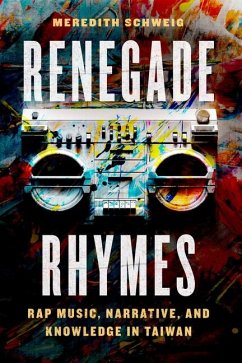"Like many states emerging from oppressive political rule, Taiwan saw a cultural explosion in the late 1980s, when four decades of martial law under the Chinese National Party ended. As a multicultural, multilingual society with a complicated history of migration and colonization, Taiwanese people met their political transformation and newfound freedom with a host of stories waiting to be told and identities longing for expression. In Renegade Rhymes, ethnomusicologist Meredith Schweig shows how rap music has become a powerful outlet for exploring the complicated ethnic, cultural, and political history of Taiwan. Schweig draws on extensive ethnographic fieldwork to explain how rap's storytelling component became such a vital tool for working out Taiwanese identity and grappling with cultural history. She takes readers to rap festivals, music video sets, hip-hop clubs, and creative collectives in which members participate in rap battles and study under an experienced teacher. As Schweig shows, MCs from marginalized ethnic groups in Taiwan seized on this music of resistance, infusing it with important aspects of their own local identities, languages, and storytelling traditions. We see how these musicians localize rap as a way to challenge longstanding political mythologies and redeem individual and community narratives from the totalizing influence of government and commercial interests. Working against holes in the educational system and a neoliberal economy, new generations of rappers have used the artform to nurture associational bonds and rehearse rituals of democratic citizenship, making a new kind of sense out of their complicated present"--
Hinweis: Dieser Artikel kann nur an eine deutsche Lieferadresse ausgeliefert werden.
Hinweis: Dieser Artikel kann nur an eine deutsche Lieferadresse ausgeliefert werden.








